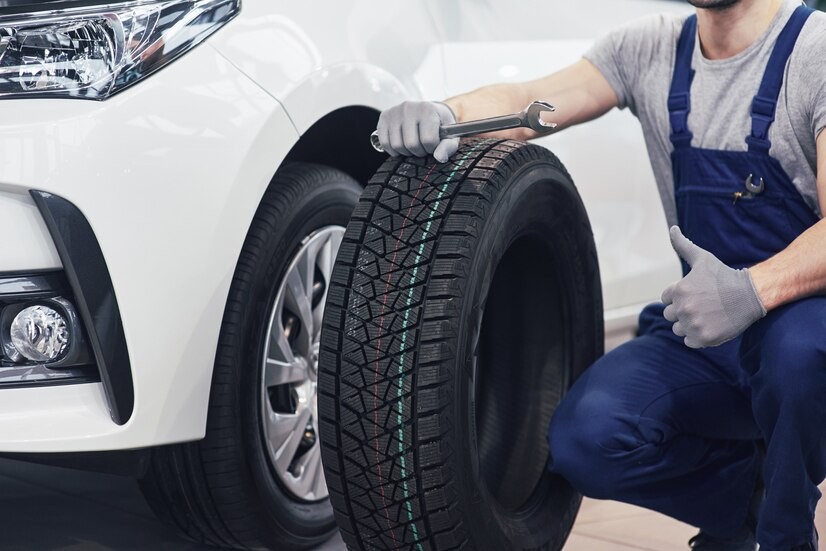 ARTICLE, 06 DECEMBER 2024
|
Last Modified: 12 AUGUST 2025
ARTICLE, 06 DECEMBER 2024
|
Last Modified: 12 AUGUST 2025
Car tires are a vital component that significantly impacts your driving comfort and safety. Proper tire care not only extends their lifespan but also ensures your car's performance remains optimal under various road conditions. This article from TAF provides practical tips on maintaining your car tires to make them more durable and safe to use. Let’s dive into the details below!
Car Tire Maintenance Tips
Maintaining car tires isn't as complicated as it may seem. By adopting regular maintenance habits, you can extend tire life, save on maintenance costs, and enhance driving comfort and safety. Here’s how to care for your car tires effectively:
1. Check Tire Pressure Regularly
Proper tire pressure ensures stability and driving comfort. Underinflated tires wear out faster and waste more fuel, while overinflated tires reduce grip on the road. Check your tire pressure at least once a month or before a long trip. Follow the pressure guidelines provided in your car's manual.
2. Rotate Tires Regularly
Tire rotation helps distribute wear evenly, as front and rear tires usually bear different loads. Rotate your tires every 5,000–6,000 miles (8,000–10,000 km) or as recommended by the manufacturer. This process extends tire life and maintains vehicle stability.
Read Also: 5 Toyota Car Recommendation for Your Family Car
3. Inspect Tire Condition
Regularly check your tires for cracks, cuts, or embedded sharp objects. Damaged tires can lead to leaks and compromise driving safety. Replace any severely damaged tires immediately to avoid accidents.
4. Avoid Overloading the Vehicle
Carrying loads beyond the car's capacity can cause tires to wear out faster and become damaged. If you frequently transport heavy items, adjust tire pressure accordingly and minimize trips that could strain the tires.
5. Ensure Proper Wheel Alignment
Proper wheel alignment is essential for vehicle stability and preventing the car from pulling to one side while driving. Misaligned wheels cause uneven tire wear and increase the risk of accidents. If you notice difficulty steering or uneven tire wear, have your alignment checked at a service center.
6. Balance Tires Periodically
Unbalanced tires can cause vibrations, especially at high speeds. Balancing your tires reduces vibrations and enhances driving comfort and safety. Perform tire balancing whenever you replace a tire or every 6,000 miles (10,000 km).
7. Use Tires Suitable for Your Vehicle and Road Conditions
Choosing the right tires impacts durability and safety. Use tires that match your car type and typical road conditions. For example, asphalt tires differ from those designed for off-road or wet conditions. Proper tire selection boosts performance and reduces slipping risks.
8. Avoid High Speeds on Rough Roads
Potholes or uneven roads can severely damage tires. Avoid driving on damaged roads when possible or reduce speed to minimize impact. Driving fast over rough terrain increases the likelihood of tire damage or punctures.
9. Keep Your Spare Tire Ready for Use
Regularly check the condition of your spare tire to ensure it's ready for emergencies. Verify that the tire pressure is adequate and inspect it for damage. A reliable spare tire is invaluable during unexpected breakdowns.
Read Also: 4 Differences Between Toyota and Daihatsu Cars That You Must Understand
Consequences of Neglecting Tire Maintenance
Proper tire care is a worthwhile investment in your driving safety and comfort. Here are some potential consequences of poorly maintained tires:
1. Increased Risk of Accidents
Neglected tires may make the car harder to control, especially on slippery roads or during sharp turns. Worn or underinflated tires reduce traction and braking efficiency, increasing the risk of skidding and collisions.
2. Damage to Other Car Components
Unbalanced or misaligned tires can strain the suspension and steering systems, accelerating wear on components like shock absorbers and ball joints. This leads to higher maintenance costs as more parts need frequent replacement.
3. Higher Fuel Consumption
Tires with improper pressure or excessive wear require more engine power to move the vehicle, leading to increased fuel consumption. Routine tire care can save fuel and prevent engine overheating caused by excessive workload.
4. Reduced Driving Comfort
Worn or unbalanced tires cause excessive vibrations and noise, making driving less enjoyable and more tiring for the driver.
Read Also: 6 Reasons to Choose Toyota Cars That Make Them the Choice of Indonesians
In conclusion, keeping your car tires in good condition is an essential part of vehicle maintenance. By following the tips above, you can ensure longer-lasting tires, optimal car performance, and enhanced safety and comfort while driving.
For those seeking flexible mobility solutions for business, TAF Fleet is the perfect choice. With tailored vehicle financing options, professional support, and access to a network of authorized dealers and service centers across Indonesia, TAF ensures efficient and reliable business mobility.
Contact TAF today and optimize your business mobility with us!

